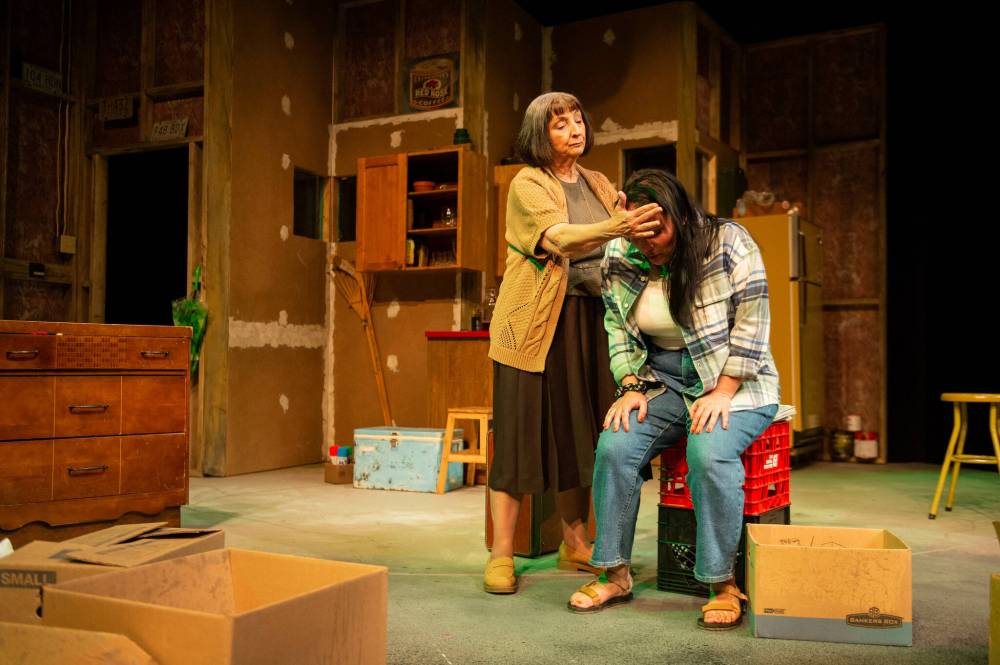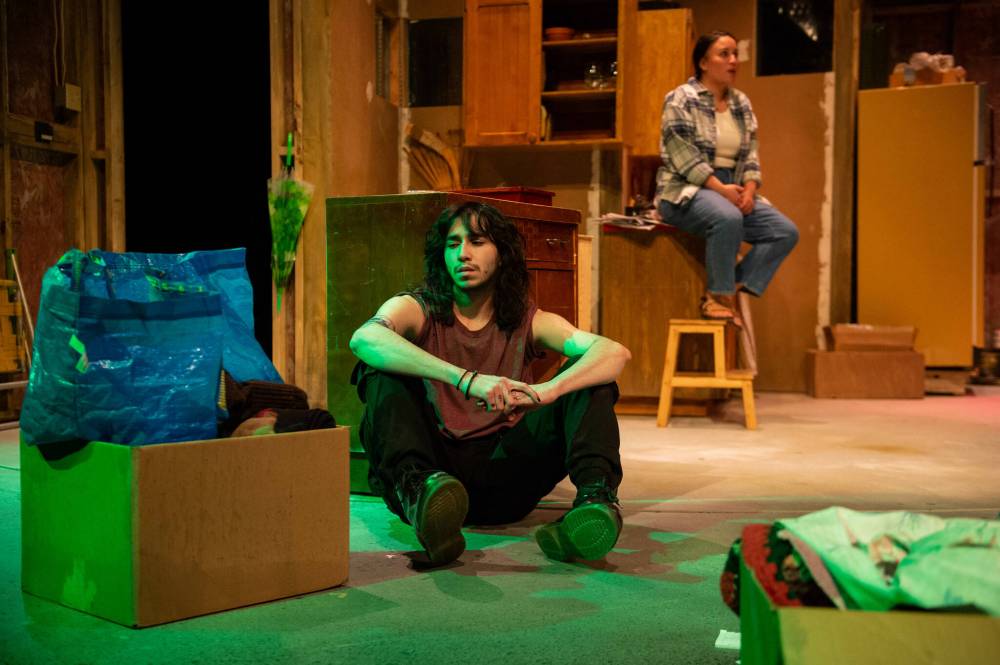Where there’s a will… Family squabbling over inheritance serves as metaphor for colonialism, broken promises
Read this article for free:
or
Already have an account? Log in here »
To continue reading, please subscribe:
Monthly Digital Subscription
$0 for the first 4 weeks*
- Enjoy unlimited reading on winnipegfreepress.com
- Read the E-Edition, our digital replica newspaper
- Access News Break, our award-winning app
- Play interactive puzzles
*No charge for 4 weeks then price increases to the regular rate of $19.00 plus GST every four weeks. Offer available to new and qualified returning subscribers only. Cancel any time.
Monthly Digital Subscription
$4.75/week*
- Enjoy unlimited reading on winnipegfreepress.com
- Read the E-Edition, our digital replica newspaper
- Access News Break, our award-winning app
- Play interactive puzzles
*Billed as $19 plus GST every four weeks. Cancel any time.
To continue reading, please subscribe:
Add Free Press access to your Brandon Sun subscription for only an additional
$1 for the first 4 weeks*
*Your next subscription payment will increase by $1.00 and you will be charged $16.99 plus GST for four weeks. After four weeks, your payment will increase to $23.99 plus GST every four weeks.
Read unlimited articles for free today:
or
Already have an account? Log in here »
Hey there, time traveller!
This article was published 03/05/2023 (953 days ago), so information in it may no longer be current.
As raindrops pound the rooftop like a jackhammer, Dominic storms into an unfinished garage with unfinished business on his mind.
There’s no insulation on the walls, and no trace of his Nonno’s classic sedan. Empty pots rest atop an ancient refrigerator, next to a plastic flamingo and a few vintage licence plates.
Cardboard boxes lie in wait, stuffed with the physical remnants of a complex family’s complicated patriarch, a hopeful romantic with a domineering streak, born in the hills of Northern Italy and buried in a barren field in the province of Manitoba: a crystal ashtray, an untuned accordion and a collection of silver spoons packed neatly into a velvet-lined case are just a few of the pieces of Nonno that remain inside the near-empty house he once filled.
Dominic (Heath V. Salazar) picks up the ashtray, lights a cigarette and inhales deeply: he is in for a long day.
Theatre review
Volare
By Elio Zarrillo
● Prairie Theatre Exchange
● To May 14
★★★★ out of five
In Winnipeg playwright Elio Zarrillo’s Volare, room to breathe and space to express are hard to come by for the three characters — Dominic, his half-cousin Grace (Lisa Goebel), and his Nonno’s common-law second wife, the tony, French-speaking Madeleine (Suzanne Kennelly) — each of whom, in his or her own way, is suffocating beneath the weight of an invisible past.
Packing up the possessions of a deceased relative is difficult enough, but Nonno, who once regaled his grandchildren with tall tales and embroiled them in old-world competitions like the card game Scopa, has left one final game for the bereaved to play: one of them — not Madeleine — will get to keep the house at 54 Rooster Bay.
“His will was very clear,” Madeleine says.
With Nonno still pulling the strings from beyond the grave, his adult grandchildren become children again, fighting over bits and pieces of inherited wealth.
As Dominic, Salazar shakes with the potential for violence, a prodigal screw-up living in a constant state of agitation. Goebel’s Grace is a volcano of repression, with anger that bubbles but never seems to quite boil over. With Dominic dressed by costume designer Joseph Abetria in military trousers and Grace wearing a pair of rings on her right hand, these grown-up kids are ready to put up their dukes in a cage match.
Dylan Hewlett Photos Elio Zarrillo’s play, Volare, focuses on a family arguing over its Italian-born grandfather’s estate.
Kennelly’s Madeleine is a disinterested referee. “Let me know when you both decide,” she says early on, leaving Dominic and Grace in the garage to sort out their quarrel. Sounds simple, right?
Zarrillo, a first-time solo playwright who uses they/them pronouns, has grand ambitions for this show as a metaphor for colonialism, inherited wealth and land ownership. In the playwright’s lengthy pre-show land acknowledgement (see sidebar), played over the mainstage sound system, they ask audience members to consider how and why they are able to live on Treaty 1 lands, acquired through conquest and unlawful colonial tactics.
The statement is a welcome change from the standard boilerplate, acting as an intriguing entrypoint for the show’s subject matter, immediately placing audience members within a colonial framework of understanding.
A minor quibble: Zarrillo’s statement has obvious social merit and value, but it does somewhat serve as an ideological spoiler, making overt before the actors even take the stage overarching themes and context that could likely have been left to audience interpretation in the ensuing 90 minutes.
A playwright’s pledge
Volare was made on Treaty 1, the stolen lands of the Anishinaabe, Ininew & Dene peoples, and the birthplace of the Red River Métis.
As this play is largely about people who have come from away, we acknowledge that we are guests on this land. Regardless of the genocidal efforts of colonization, this land and these waters have never stopped being Anishinaabeg, Nehiyawak, Denesuline and Métis.
Volare was made on Treaty 1, the stolen lands of the Anishinaabe, Ininew & Dene peoples, and the birthplace of the Red River Métis.
As this play is largely about people who have come from away, we acknowledge that we are guests on this land. Regardless of the genocidal efforts of colonization, this land and these waters have never stopped being Anishinaabeg, Nehiyawak, Denesuline and Métis.
The makers of Volare wish to express our unending gratitude and reverence for the existence and labour of Two-Spirit and Indigiqueer peoples, historically and today. Without the paths they have and continue to forge, lives like many of ours and a play like this would not be possible.
Throughout the writing of this play I have reflected on certain understandings and beliefs around land and property. The practice of buying, selling and owning land and property is deeply rooted in colonialism. I come from a family of Italian immigrants. By coming here in search of a “better life,” we were sold the story that to prosper, one must own land and property… not considering that this land had belonged to Indigenous peoples since time immemorial. My lived experience has been influenced and privileged by the prioritizing and upholding of these values, by this aspect of colonization.
The consequences of continued settler occupation of this land are ever prevalent.
These particular words do nothing in the form of tangible reparations, but I do hope that they can encourage us to reflect on who had to step aside and what was lost, so that so many of us may live the lives that we do. Even though we cannot fix the damage that has been done, it is essential that we consider how we might step aside and what we can sacrifice in our own lives, in support of a road back to Indigenous sovereignty on these Indigenous lands.
— playwright Elio Zarrillo’s pre-show address
With such a direct preamble, Zarrillo raised the stakes of their own première, building the pressure placed on the actors in the angular set, designed by David Oro to resemble the bellows of a squeezebox, folding inward and resembling unceasing tension.
Oro’s revolving set, somehow both sparse and overflowing, extends to the outer limits of the Cherry Karpyshin Mainstage, nearly allowing the actors to enter the seating area and bringing their conflict strikingly close to the front row. With no risers, under Hazel Venzon’s direction, the three actors stand on equal ground as they trade verbal jabs and emotional uppercuts.
At times, during heated discussions, one of the actors turns their back to the audience: this is usually a no-no, but it creates the feeling for audience members of being involved in the fight themselves.
Each combatant has their own style. Dominic is a flashy fighter, the kind who winds up for a death blow but cries “zio” when he gets a papercut. Grace is a strategist, knowing before she gets into a battle the exact weaknesses of her opponents. Madeleine is an artful dodger, leaving the ring before she does or says something she will regret, knowing when to walk away before someone gets emotionally knocked out.
“Where did Grace go?” Madeleine asks after Dominic lobs a destructive insult his relative’s way. It’s a question with two meanings.
Aside from cardboard boxes, Nonno left behind a double-edged legacy of passion, something Zarrillo wrestles with throughout this show: with love that strong, traditions that fierce and family ties so valued, there are bound to be bruises and scars.
Volare’s land acknowledgement goes beyond typical boilerplate narration and serves as a template for the coming story.
Nonno left behind a personal motto that serves as both a call to unity and a rallying cry of division. “Blood is family, and the rest is strangers.”
But the truth about blood is not that clear. A father and son may share genetics, but nothing more, neither a hobby nor a blood type. Meanwhile, inside two complete strangers’ veins there flows the same type of connective tissue, able to shift from one body to another in order to restore and replenish a depleted resource.
No, Madeleine, Dominic and Grace are not related. But through circumstance, trauma and, most of all, the materials of memory, they will forever be connected under Nonno’s roof, no matter whose name is signed on the deed.
Cut them. Do they not bleed?
ben.waldman@winnipegfreepress.com

Ben Waldman is a National Newspaper Award-nominated reporter on the Arts & Life desk at the Free Press. Born and raised in Winnipeg, Ben completed three internships with the Free Press while earning his degree at Ryerson University’s (now Toronto Metropolitan University’s) School of Journalism before joining the newsroom full-time in 2019. Read more about Ben.
Every piece of reporting Ben produces is reviewed by an editing team before it is posted online or published in print — part of the Free Press‘s tradition, since 1872, of producing reliable independent journalism. Read more about Free Press’s history and mandate, and learn how our newsroom operates.
Our newsroom depends on a growing audience of readers to power our journalism. If you are not a paid reader, please consider becoming a subscriber.
Our newsroom depends on its audience of readers to power our journalism. Thank you for your support.







